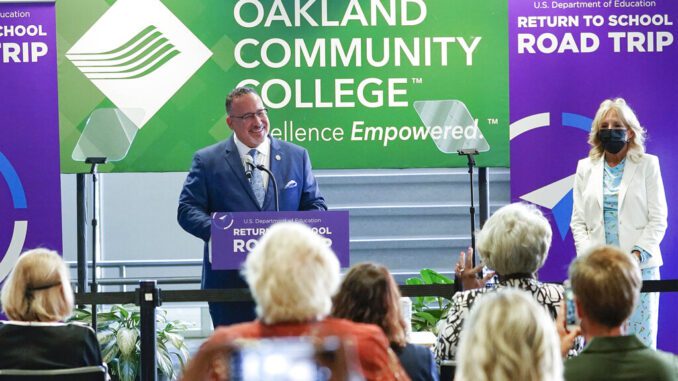
RALEIGH — The N.C. Coalition for Charter Schools has joined a lawsuit seeking to block regulations imposed on the federal Charter Schools Program by the Biden administration’s Department of Education.
The lawsuit said the U.S. Department of Education “has set out new criteria for grant awards that are designed to decrease charter school programs, and ensure that failing public schools don’t have to compete with innovative alternatives.”
“Our organization exists to promote and protect charter schools. All children deserve options in their public schooling, and the onerous restrictions imposed by the Dept. of Education threaten that vision,” Executive Director of the N.C. Coalition for Charter Schools Lindalyn Kakadelis said in a statement.
The other plaintiffs include the Michigan Association of Public School Academies, The Thomas B. Fordham Institute, Delaware Charter Schools Network, and the West Virginia Charter Professional Charter School Board.
Per a press release, the national nonprofit legal group Pacific Legal Foundation is representing the plaintiffs free of charge.
“This attack on charter schools is not only deeply unfair to kids who would benefit from educational alternatives, it’s illegal,” said Caleb Kruckenberg, an attorney with Pacific Legal Foundation. “The Department of Education has no authority to issue these new rules. The agency cannot advance a policy agenda contrary to Congress’ clear instructions otherwise.”
The program that is the focus of the lawsuit is the federal Charter Schools Program (CSP), which offers grants to offset costs for creation, expansion, and replication of public charter schools. With bipartisan support, Congress expanded the CSP in 2015. The expansion included specific details on how CSP grant money should be disbursed.
Earlier in 2022, the Biden administration’s Department of Education proposed restrictions on the CSP which plaintiffs contend was “not authorized by Congress” and that the department exceeded its legal authority.
“The Department’s attack on the charter school program it is tasked with administering is unlawful. Not only does the Department lack the authority to issue any new criteria; the proposed factors will punish the most successful charter school programs, particularly in school districts that enroll large numbers of minority students,” the lawsuit states. “All the while, the rule comes from an agency employee and lacks even the blessing of a properly-appointed officer of the United States. The Department’s sneak attack on the charter school program, and on the students caught in the middle, must be set aside by this Court.”
Biden’s education department saw heaving backlash in the form of over 26,000 public comments submitted to its proposed CSP changes as well as protests in Washington, D.C. by charter school advocates.
Plaintiffs say the new restrictions are “onerous” because they require public charter schools seeking CSP grants to engage in practices and maintain enrollment statistics that are not required of traditional public schools or the districts those schools fall under.
The requirements would force public charter schools to show there is over-enrollment in existing schools before receiving grant funds, which the plaintiffs say is “in effect treating public charter schools as mere overflow spaces.”
Public charter schools would also be required to collaborate with local school districts despite many traditional districts both fighting the creation of new charter schools and trying to dismantle or defund those that do exist. According to the plaintiffs, this requirement “effectively grants them [districts] a veto over public charter schools.”
Biden’s Department of Education also proposes public charter schools must mirror the racial makeup of the entire district they reside in. The racial makeup requirement is problematic due to the fact charter schools cannot control who applies to their school.
In other words, the requirement could essentially force charters to enact racial enrollment quotas – something that most traditional districts do not do nor are they required to.
An example given by the plaintiffs in the case is the Sallie B. Howard School, a school with National Blue Ribbon designation. The majority served by the school are students of color and the requirement could block it from obtaining CSP grant funds.
Enrollment in charter schools in North Carolina is at the discretion of parents. If a charter school has more applications for any given grade level than seats, a blind lottery system is employed to determine enrollment.
North Carolina currently has 203 charter schools serving over 130,000 students and 7 schools participating in the planning year that are scheduled to open in Fall 2022, according to the N.C. Department of Public Instruction.
Additionally, twenty non-profit boards submitted applications to open a school on or before this year’s April application deadline. Five of those boards are seeking approval to open in the 2023-24 school year and 15 are looking to open for the 2024-25 school year.




